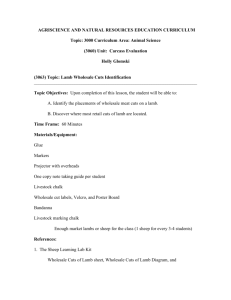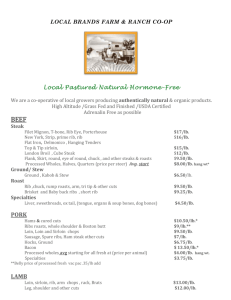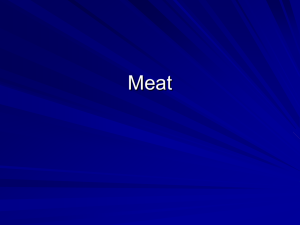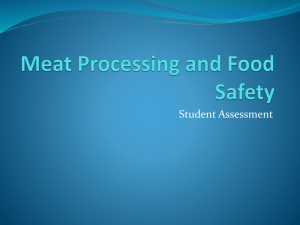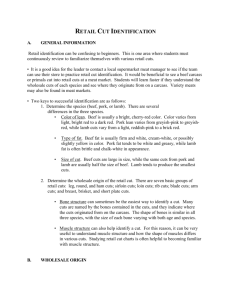Meat Terminology.ppt
advertisement
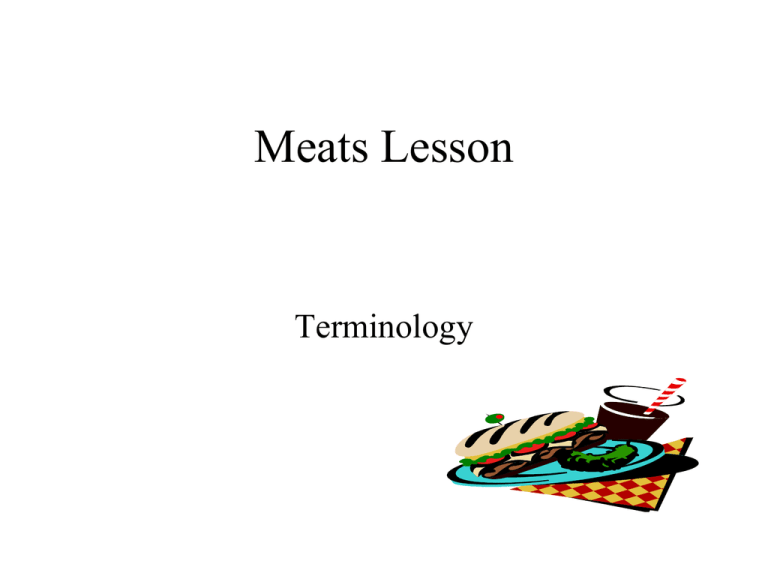
Meats Lesson Terminology Types of Cuts Meat Terminology Meat cuts Beef Pork Lamb Wholesale Wholesale Wholesale Retail Retail Retail Meat Terms Carcass-body of the animal with the skin or hide , entrails and other extremities removed Quality-Edibility of the meat Yield- Amount of meat in comparison to bone and fat Lean- Part of the flesh consisting of the muscle without the fat Rib Eye- Large muscle laying outside the rib, used as an indicator of quality and yield Terminology Cod- Part of the scrotum left after castration Ossification- Cartilage changing into bone Marbling- Flecks of fat in the meat Conformation- Visual appearance of the carcass Hot Carcass- Weight of carcass before cooling PYG- Preliminary Yield Grade Terminology -contMaturity- Age of animal as indicated by carcass characteristics Roast- Thick cut of meat usually less than 11/2 inch of more Steak- Thin cut of meat usually less than 1 1/2 inches or more Sweetbreads-Thymus glands of pancreas Terminology -contBnls -- Abbreviation for “Boneless” Variety Cuts - Refers to those retail cuts coming from the glands or organs Various Cuts - Refer to those retail cuts that have to be prepared prior by mixing or cooking Cured or Smoked - Those retail cuts that are prepared by cooking or smoking. Important Steps in Identification of Meat Wholesale and Retail Cuts Bone Structure Color Fat Texture and Color Wholesale Cuts Retail Cuts Bone Identification Knowing where the bones are located will help you identify where the meat cuts originate 1. Neck Bone 2. Back Bone 3. Slip Joint 4. Tail Bone 5. Blade Bone 6. Arm Bone 7. Fore Shank 8. Elbow 9. Breast Bone 10. Rib Cartilage 11. Rib 12. Pelvic Bone 13. Leg 14. Knee Cap 15.Stifle Joint 16. Hind Shank The name of meat cuts are frequently named in relation to the bone structure Examples of this would be --Arm Steak, Arm Roast, T-Bone Steak, Rib Steak, Flank Steak, Round Steak ECT. Shoulder, Arm Cuts Shoulder Blade Cuts Rib Cuts Short Loin Cuts Hip (Sirloin) Cuts Leg or Round Cuts Breast or Brisket Arm Bone usually round Blade Bone Back and Rib Bones Back and T-Bones Pin Bone, FlatBone,Wedge Round Bone Leg or Round Bones Breast and Rib Bones Color of the Lean is a Major Factor in Identification Different species of animals have different color characteristics.Beef normally shows a bright cherry red color. Pork ranges from grayish pink to a delicate rose color. Lamb is a pinkish dark red. FAT IS A FACTOR IN THE IDENTIFICATION OF MEAT CUTS Beef Fat is cream colored and quite rigid Pork Fat is greasy white and has few or no air pockets Lamb Fat is white and tends to be flaky Wholesale Cuts Because of an animals size the carcass has to be divided in smaller portions for ease of handling and for customer purchasing. These portions are called wholesale or primal cuts. These wholesale or primal cuts are then broken down into retail cuts which are generally the portions we see on the grocery counters. Wholesale Cuts of Beef-Pork-Lamb *Indicates number matches worksheet Beef Wholesale 1. Chuck 2. Rib 3. Shank 4. Brisket 5. Short Loin 6. Sirloin 7. Round 8. Flank Pork Wholesale 1.Jowl 2. Boston Blade 3.Picnic Shoulder 4.Belly 5. Loin 6. Leg Lamb Wholesale 1. Shoulder 2. Rib 3. Foreshank 4. Breast 5. Loin 6. Leg Yield Grades of Beef U.S. #1 U.S. #2 U.S. #3 U.S. #4 YIELD GRADES OF LAMB U.S. #1 U.S. #2 U.S. #3 U.S. #4 QUALITY GRADES OF LAMB Prime Choice Utility YIELD GRADES OF PORK U.S. #1 U.S. #2 U.S. #3 U.S. #3 QUALITY GRADES OF BEEF Prime Choice Select Standard Commercial Utility Cutter Canner

